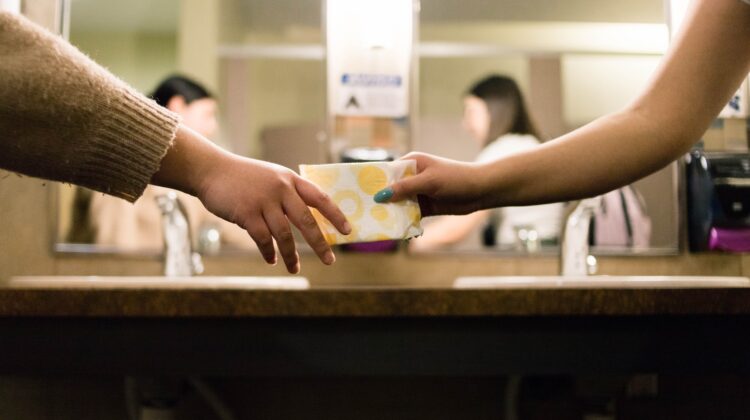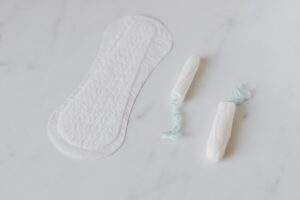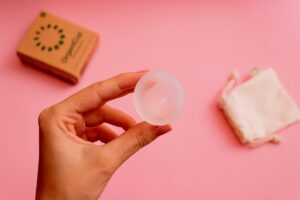
Since the time menstrual hygiene products forayed into the market, it has been quite synonymous with the improvement of the quality of life and a sense of independence during menstruation for women. But, it did take a long time for everyone to identify the risks associated with synthetic sanitary napkins.
Hazards that come along with synthetic napkins are two-fold – for the user and the environment. Let’s look at them first.
Personal Risks
Synthetic sanitary pads expose a woman to certain harmful substances that can cause undesirable side effects and are detrimental to health. Women use such napkins and place them close to the skin for an average of 5 days a month.
The skin around the vaginal area is highly absorbent. Therefore, if substances come in close contact with that area, they may easily get absorbed into the bloodstream.
Recent researches show that :
- Synthetic pads use dioxin, which is a bleaching agent. So, it has the potential to cause cancers when absorbed into the body.
- Plastics are used as linings over the pad that can cause vaginal infections and in serious cases, even pelvic diseases.
- Companies use cheap components for the fragrance associated with the freshness of the napkins that can cause serious irritations and allergies. Also, these chemicals, in worst cases, can even cause complications in reproduction.
Environmental Risks
Apart from the personal concerns, the looming environmental risks that tag along with the usage of synthetic napkins are unthinkable.
On average, a woman uses 11000 to 17000 pads during her menstruating age. And again, it is no secret that it takes about 500 to 800 years for a synthetic pad to decompose. Also, as companies use a lot of plastic and other non-biodegradable substances, it is hazardous to health.
Risks to the environment are manifold which inadvertently affects life on the planet. As a lot of awareness has been created about minimizing one’s carbon footprints on the planet, it is essential to look for more sustainable options for a healthy body and a healthy surrounding.
Keeping in mind both environmental safety and a woman’s health, this article targets listing out eco-friendly menstrual hygiene products for women. These are indeed healthier options both for the user and the environment.
Cloth Pads
A cloth pad is an idea borrowed from age-old techniques followed by our grandmothers, who used layers of cloth pieces to soak their menstrual flow. This idea has been refined and reutilized in a better version these days to match the current lifestyle. This is one of the safest and most sustainable options possible.
Cloth menstrual pads are generally made out of absorbent fabrics, such as cotton, hemp, terrycloth, bamboo terry, etc. Also, they contain layers of absorbent materials depending on the type chosen to suit one’s needs. They are also available in varying lengths and thicknesses. Nowadays, they have become popular again as there are a lot of good quality cloth pads available in the market.
These pads are similar to disposable pads in usage. They can be worn with underwear to collect the menstrual fluid. You can change them every few hours depending on your flow. They are easy to wash and are very much reusable. Moreover, you can soak, wash and dry them in sunlight for functional reusability.
Sunlight acts as a disinfectant and stops microbial growth. More importantly, they are comfortable and environmentally friendly.
Reusable Panty Liners and Period Panties

A panty liner is a relatively thinner absorbent piece of material used for feminine hygiene. As the name says, it is worn inside the panty. Apart from the disposable ones, reusable panty liners are also available that function similar to cloth pads. Pantyliners are thinner and are best put to use during those few days before and after periods to absorb any vaginal discharge, light menstrual flow, or spotting.
They are designed in such a way that they are ideal for light discharge and everyday cleanliness. Also, the maintenance of reusable and organic cotton liners is similar to that of a cloth pad. They need to be washed properly and dried in sunlight. Period panties function very similarly to that of the cloth diapers that many mothers prefer to use for their kids these days. These are panties with built-in pads and absorbent materials for period protection. These panties even come with extra cloth pads that can be fitted inside during days of heavy flow.
They come in various styles, sizes, fabrics, and holding capacities. These are easily washable and can be reused as many times possible, making them user-friendly and environmentally friendly.
Organic Sanitary Napkins
As the best alternative to synthetic napkins, these organic counterparts are very eco-friendly as well as user-friendly. These are very similar to the synthetic pads but are made out of naturally available absorbents. They are all bio-degradable and easily get decomposed within six months, without causing pollution through landfills.
Some examples of materials used to make organic pads are banana plant fiber, jute fiber, organic cotton, bamboo fiber, and corn starch. Many Indian start-ups have ventured into manufacturing these organic pads and are targeting both the rural and the urban areas to create awareness of its eco-friendliness.
Menstrual Cup

This feminine hygiene product is slowly making its way into the Indian market, with many women replacing sanitary pads with menstrual cups during their menses cycle.
It is a small and flexible funnel-shaped cup made of medical-grade silicone. The cup is inserted into the vagina to collect the menstrual fluid and can provide leak-free protection for a maximum of 12 hours depending on the flow. You can wash, sterilize, and reuse them. They have a shelf-life of about 10 years.
This makes it a highly recommended environmental-friendly product. Disposable menstrual cups are also available, which are equally eco-friendly.
Also, since it is made out of medical-grade silicone, it doesn’t cause any harm to the user, even over the long run. Minor demerits come in the form of finding the cup of the right size and fit and a steep learning curve on how to use it.
Menstrual Sponges and Discs
Though sponges and discs are yet to make a widespread presence in India, they are available as alternatives in feminine hygiene products.
Sponges or sponge tampons are made out of natural sea sponges sourced from the ocean and can be reused for up to six months. They are free of chemicals, fragrances, bleach, or any synthetic materials. Similar to the cup, you can insert the menstrual disc into the vagina. While the cup is placed inside the vaginal canal, the disc sits at the vaginal fornix, which is deeper into the canal, making it a more leak-free option during periods.
Hope this article serves its purpose for you to make the change! You can take the plunge into using safer and nature-friendly feminine menstrual hygiene products. It is high time to make a conscious decision to keep a healthy life and healthy surroundings in mind.
References:-
Heydaycare.com
Wikipedia.com
Articles from DeccanHerald
I am really glad to read this weblog posts which carries tons of valuable
data, thanks for providing these kinds of data.
I am happy that you found it useful. Thanks for stopping by.
Hey there! I’ve been reading your site for a while now and finally
got the courage to go ahead and give you a shout out from Houston Tx!
Just wanted to tell you keep up the great job!
Thank you!
A fascinating discussion is worth comment. I do think that
you should write more on this subject matter, it might not be a taboo subject but usually folks don’t discuss such topics.
To the next! All the best!!
Thank you for reading and appreciating!